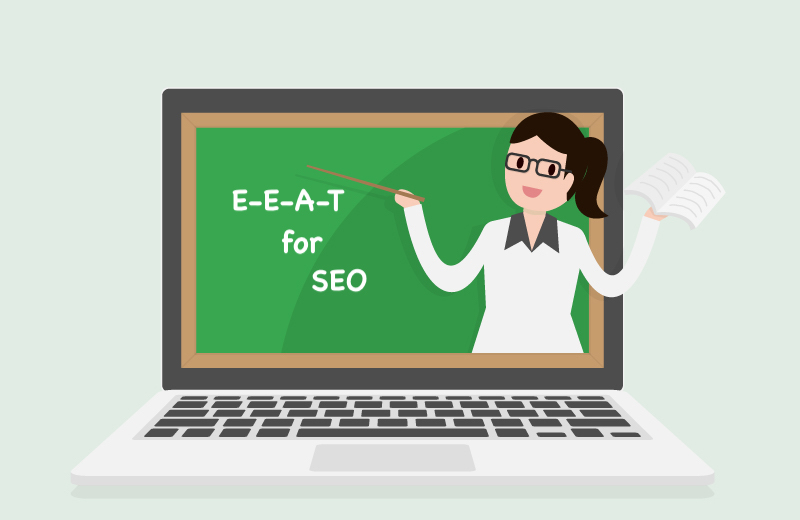
What is E-E-A-T for SEO?
E-E-A-T is a set of metrics Google considers in determining whether the content on a website is high-quality, and it’s been a subject with quite a lot of buzz in SEO circles in recent years.
E-E-A-T stands for Experience, Expertise, Authoritativeness, and Trustworthiness and breaks down like this:
- Experience: Does the content draw from firsthand encounters and knowledge?
- Expertise: Does the content show deep knowledge about the topic?
- Authoritativeness: Is the content or website seen as a trusted source on the topic?
- Trustworthiness: Can users trust the information and feel safe when using the website?
In short, if you are an actual expert who knows what you’re talking about, Google wants to reward your content with higher rankings to help search visitors get the best answers possible to their queries.
Google is thinking about this from the user’s perspective. If you are looking for solutions to skincare concerns, for example, you will want content written by board-certified dermatologists or qualified skincare experts rather than some random person generating un-checked AI articles for their affiliate website.
E-E-A-T is a key part of the quality rater guidelines that are core to Google’s helpful content guidelines. Google says that there’s no measurable E-E-A-T score or rating baked into the algorithm, but there are important signals for each factor that will be reviewed by their team of search quality raters. These people provide feedback about the automated rankings based on a specific set of criteria designed to improve the search experience.
So, what are these E-E-A-T factors and how can you optimise for them?
Experience
Experience is about what the writer personally knows and the authenticity of their connection to the site topic.
Say, for example, you’re researching about hiking a particular mountain trail. Who would you trust: a writer with decades of hiking experience who has personally hiked that trail and can share firsthand stories and tips? Or someone who just looked up information about the trail online and remixed the info to create an article? The writer with personal experience obviously brings depth and authenticity to the content that the mere researcher cannot replicate.
Here are some ways to highlight experience in your content:
Include an author bio or about us page
For years, people have been putting these on their websites, but now those About Us pages actually offer a bit of heft when it comes to SEO if done correctly. Make sure you highlight how long you’ve been in the industry and what makes you an expert on your topic.
Share personal stories
Narratives and anecdotes from personal experiences can make your content more engaging and relatable, but also make it clearer that you are an actual expert and a human that stands behind the authenticity of the content.
Include authentic images
Hire a professional photographer to get authentic photos that will be unique to your website. This is always recommended for images of your office, business, and team. In the hiking example, we’d encourage you to use actual photos taken during your hike rather than something borrowed from an Outdoor Magazine piece.
Highlight lessons learned
If you’ve learned something from your personal experiences that isn’t commonly found online, share it. Offering unique tips and lessons can make your content stand out and provide extra value to readers.
Be transparent
Clearly state who you are and your level of experience with the topic so readers understand the perspective you’re writing from. If you’ve only experienced the topic–say hiking–once, say so.
Expertise
Expertise refers to how knowledgeable the content creator is about the topic they’re discussing. It’s all about having the right skills, understanding, and credentials to discuss a subject in depth.
Imagine you’re keen on learning to play the guitar. Would you prefer guidance from a musician who has been performing and teaching guitar for over a decade, or from someone who only knows a couple of chords they picked up from a brief online tutorial? Most would favour the seasoned musician’s guidance, right? This encapsulates the principle of expertise in EEAT.
Google wants to make sure that the content they show users comes from people who really know what they’re talking about. This means that if you’re writing about a topic, it’s a good idea to:
Show your credentials
If you have any qualifications or experience related to the topic, mention it. For example, if you’re writing about cooking, mention your experience as a chef, add a link to restaurants you’ve worked in or to your published cookbooks, and make sure those external sites also link to your website.
Provide in-depth information
Don’t just scratch the surface and share the same info as everyone else. Dive deep into the topic to show that you have a thorough understanding and provide high-quality content that offers something unique to your readers thanks to your experience and expertise.
Stay updated
Things change, and what was true a year ago might not be now. Make sure your content and your credentials are always up-to-date.
In short, expertise is all about proving that you’re the right person to discuss a particular topic. The more you can show your knowledge and skills, the better your content will be received by the quality raters and your search visitors.
Authoritativeness
Authoritativeness in the context of E-E-A-T refers to your (or your website’s) reputation and recognition in the industry. It’s like being recognised as an expert or a go-to source for a particular topic.
Think of it this way: If you have a question about consumer law, you’d probably trust an answer from the Australian Consumer Law more than a random blog, right? That’s because ACL has authority when it comes to these topics.
So, how can you make your website more authoritative? Here are some simple tips:
Get quality backlinks
Backlinks are like recommendations from other websites. When trusted sites link to your content, it boosts your website’s reputation. To get quality backlinks, focus on creating great content that others naturally want to reference. Also, build genuine relationships with industry peers and consider guest posting on reputable sites.
Share expert content
If you or someone on your team is an expert on a topic, share that knowledge. Write detailed articles, make videos or host webinars. Don’t forget to mention the name of this expert on these pages, including whether they were a writer, contributor, or even a fact-checker.
Update content when necessary
Make sure your content is fresh and up-to-date. Outdated information can hurt your website’s reputation, especially in fast-changing fields.
Implement author schema
If you’re working with an SEO agency, ask them whether they’re implementing author schema (also called structured data) in a way that will help Google understand better who you are. Structured data is a layer of code in the backend of the website that can clarify to Google the types of content on a page. As part of this, it can connect you with your professional presence elsewhere on the web, including your social media profiles, positions in industry organisations, or other notable publications.
Building authoritativeness takes time, but consistently deliver quality content, and you’ll earn the trust of your audience and peers in your field.
Trustworthiness
Trustworthiness is all about making sure users can trust your website and the information and services you provide. It’s essential because if people don’t trust your site, they won’t spend much time (or money!) on it, and they might not come back.
Here’s how to think about it: If you’re shopping online, you’d want to buy from a website that looks safe, has good reviews, and protects your personal information, right? That’s the kind of trustworthiness we’re talking about.
Here are some simple ways to boost your website’s trustworthiness:
Secure your website
Make sure your website has an SSL certificate. This encrypts data and makes your site more secure. You can tell a site is secure if the URL starts with “https” instead of just “http.”
Be transparent
Have clear policies on your website, like a privacy policy or return policy. Let people know how you handle their data and what they can expect from you.
Show real reviews
If customers leave reviews or testimonials, show them on your site. Real feedback is a great way to help build trust.
Avoid misleading information or dodgy ads
Always double-check your facts and avoid clickbait titles. Being honest and accurate helps build trust with your audience. If your site featured advertising of any kind,
E-E-A-T in a nutshell
E-E-A-T is a roadmap to creating high-quality content that not only ranks well in search results but also genuinely serves users. By focusing on showcasing deep knowledge and expertise, establishing credibility, and ensuring that your content is trustworthy, you’re setting your website up for success.
Need help with implementing E-E-A-T signals on your website or with other advanced SEO strategies? Request an SEO proposal today and let’s get started.


